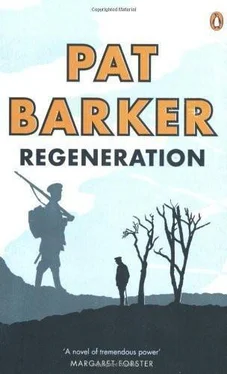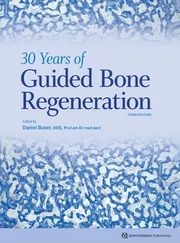Rivers smiled. ‘What are friends for if not letting you off the hook?’
‘Well, let me get you off the other hook while I’m about it. You and Yealland doing essentially the same thing. Good God, man, if you really believe that it’s the first sign of dementia. I can’t imagine anybody less like Yealland — methods, attitudes, values — everything. The whole attitude to the patient. And in spite of all this self-laceration , I can’t help thinking you know that. Who would you rather be sent to if you were the patient?’
‘You.’
Head smiled. ‘No. I don’t say I do a bad job, but I’m not as good with these particular patients as you are.’
‘I suppose I’m worried about him.’
‘Yes. Well…’
‘I think what bothers me more than anything else is this total inability to think about after the war. You see, I think he’s made up his mind to get killed.’
‘All the more reason for you to get it clear whose decision it was that he went back.’ A pause. ‘You know after dinner the other night Ruth was saying how much she thought you’d changed.’
Rivers was looking out of the window.
‘Do you think you have?’
‘I’m probably the last person to know. I can’t imagine going back to the same way of life. But…’ He raised his hands. ‘I’ve been there before. And…’ A little, self-deprecating laugh. ‘Nothing happened.’
‘When was this?’
‘After my second trip to the Solomons.’
Head waited.
‘I don’t know whether you’ve ever had the… the experience of having your life changed by a quite trivial incident. You know, nothing dramatic like the death of a parent, or the birth of a child. Something so trivial you almost can’t see why it had the effect it had. It happened to me on that trip. I was on the Southern Cross — that’s the mission boat — and there was a group of islanders there — recent converts. You can always tell if they’re recent, because the women still have bare breasts. And I thought I’d go through my usual routine, so I started asking questions. The first question was, what would you do with it if you earned or found a guinea? Would you share it, and if so who would you share it with? It gets their attention because to them it’s a lot of money, and you can uncover all kinds of things about kinship structure and economic arrangements, and so on. Anyway at the end of this — we were all sitting cross-legged on the deck, miles from anywhere — they decided they’d turn the tables on me, and ask me the same questions. Starting with: What would I do with a guinea? Who would I share it with? I explained I was unmarried and that I wouldn’t necessarily feel obliged to share it with anybody. They were incredulous. How could anybody live like that? And so it went on, question after question. And it was one of those situations, you know, where one person starts laughing and everybody joins in and in the end the laughter just feeds off itself. They were rolling round the deck by the time I’d finished. And suddenly I realized that anything I told them would have got the same response. I could’ve talked about sex, repression, guilt, fear — the whole sorry caboodle — and it would’ve got exactly the same response. They wouldn’t’ve felt a twinge of disgust or disapproval or… sympathy or anything, because it would all have been too bizarre. And I suddenly saw that their reactions to my society were neither more nor less valid than mine to theirs. And do you know that was a moment of the most amazing freedom. I lay back and I closed my eyes and I felt as if a ton weight had been lifted.’
‘Sexual freedom?’
‘That too. But it was it was more than that. It was… the Great White God de-throned, I suppose. Because we did, we quite unselfconsciously assumed we were the measure of all things. That was how we approached them. And suddenly I saw not only that we weren’t the measure of all things, but that there was no measure.’
‘And yet you say nothing changed?’
‘Nothing changed in England. And I don’t know why. I think partly just the sheer force of other people’s expectations. You know you’re walking around with a mask on, and you desperately want to take it off and you can’t because everybody else thinks it’s your face.’
‘And now?’
‘I don’t know. I think perhaps the patients’ve… have done for me what I couldn’t do for myself.’ He smiled. ‘You see healing does go on, even if not in the expected direction.’
Rivers’s return to Craiglockhart on this occasion was quieter than any previous return had been. There were no boisterous young men playing football with a visitor’s hat; indeed, the whole building seemed quieter, though Brock, whom Rivers sat next to at dinner, said that the change in regime had not been as striking as had been intended. The wearing of Sam Browne belts was strictly enjoined and offenders relentlessly pursued, but, aside from that, the attempt to run a psychiatric hospital on parade ground lines had been briefly and vociferously tried, then rapidly and quietly abandoned.
After dinner Rivers set out to see the patients who were due to be Boarded the following day. Anderson had at last received a visit from his wife, though it didn’t seem to have cheered him up much. The conflict between himself and his family, as to whether he should return to medicine or not, was deepening as the time came for him to leave Craiglockhart. The nightmares were still very bad, but in any case the haemophobia alone prevented any hospital service whether in Britain or France. Rivers hoped that he would be given a desk job in London, which would also enable Rivers to go on seeing him. At the same time he was a little doubtful even about that. Anderson had moved from a position of being sceptical and even uncooperative to a state of deep attachment, in which there was a danger of dependency. He left Anderson’s room shaking his head.
Sassoon was sitting by the fire in almost the same position he’d been in when Rivers left.
‘What have you been doing with yourself?’ Rivers asked.
‘Trying to keep my head down.’
‘Successfully?’
‘I think so.’
‘Have you managed to write?’
‘Finished the book. It’s called Counter-Attack.’
‘Very appropriate.’
‘You shall have the first copy.’
Rivers looked round the room, which seemed cold and bleak in spite of the small fire. ‘Do you hear from Owen at all?’
‘Constantly. He… er… writes distinctly effusive letters. You know…’ He hesitated. ‘I knew about the hero-worship, but I’m beginning to think it was rather more than that.’
Rivers watched the firelight flicker on Sassoon’s hair and face. He said, ‘It happens.’
‘I just hope I was kind enough.’
‘I’m sure you were.’
‘I don’t suppose you’ve heard from the War Office?’
‘On the contrary. I had dinner with Hope the other night, and I have an informal assurance that no obstacles will be put in your way. It’s not a guarantee, but it’s the best I can do.’
Sassoon took a deep breath. ‘All right. Back to the sausage machine.’
‘It doesn’t mean you don’t have to be careful with the Board.’
Sassoon smiled. ‘I shall say as little as possible.’
The Board was chaired by the new CO, Colonel Balfour Graham. The previous evening Rivers and Brock had discussed the likely effects of this on the conduct of the Board, but had not been able to reach any firm conclusion. Balfour Graham hadn’t had time to get to know most of the patients. Either he’d be content simply to move things along as smoothly as possible or, at worst, he might feel obliged to assert his authority by asking both patient and MO more questions than was usual. The third member of the Board was Major Huntley, still — if his conversation over breakfast was anything to go by — obsessed by rose growing and racial degeneracy.
Читать дальше












